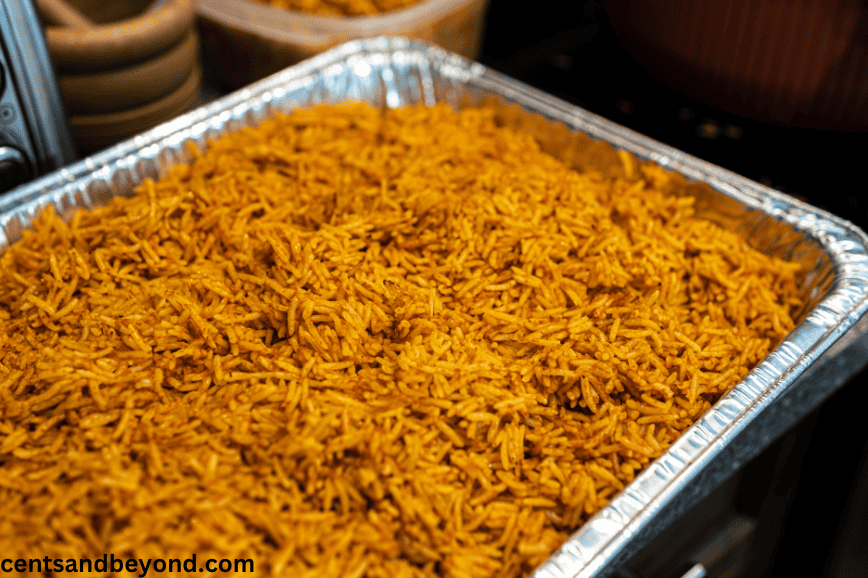How to Start a Jollof Rice Business in Nigeria (2024)
If you have a passion for cooking and want to turn it into a profitable business, starting a Jollof rice business in Nigeria may be the perfect opportunity for you.
Jollof rice is a popular dish in Nigeria and is enjoyed by many. With a little bit of planning and hard work, you can turn your love for cooking into a profitable business venture.
Before starting your Jollof rice business, it is essential to research and determine if there is a demand for it in your area.
You can start by conducting market research to determine what your potential customers are looking for and what they are willing to pay for it.
Once you have determined a demand for Jollof rice in your area, you will need to secure startup capital to get your business up and running.
This can be done by dipping into your savings, considering a loan, or seeking out potential investors who believe in your flavorful venture.
With the proper planning and execution, your Jollof rice business can be a successful and profitable venture.
Understanding the Jollof Rice Market

Demand Analysis
Jollof rice is a staple dish in Nigeria consumed by people of all ages and backgrounds.
The demand for this dish is high, and it is a popular choice for events such as weddings, birthdays, and other celebrations.
According to Demand Africa, Jollof rice is a cultural symbol of African cuisine and has gained popularity worldwide.
As a result, there is a constant demand for Jollof rice in Nigeria and beyond.
Target Demographics
Your target demographic for a Jollof rice business would be people who enjoy Nigerian cuisine, families, and individuals who celebrate special occasions.
You can also target corporate events, such as business meetings and conferences, where catering services are required.
It is essential to consider the income level of your target customers, as Jollof rice is not a cheap meal.
The cost of ingredients, packaging, and other expenses should be factored into the pricing strategy.
Business Plan for How to Start a Jollof Rice Business in Nigeria
When starting a Jollof Rice business in Nigeria, proper business planning is crucial to ensure the success of your venture.
Business Model
Before you start your jollof rice business, you need to decide on the business model that you will use. There are several options to consider, including:
- Catering Business: This model involves cooking and delivering jollof rice to customers for events such as parties, weddings, and corporate events.
- Restaurant Business: This model involves opening a physical restaurant where customers can come and dine in or take out jollof rice.
- Food Truck Business: This model involves operating a food truck that sells jollof rice at various locations.
Each business model has its advantages and disadvantages, and you should choose the one that aligns with your goals and resources.
Financial Projections
To ensure that your jollof rice business is profitable, you need to create financial projections.
This involves estimating your startup costs, revenue, and expenses. Some key financial considerations include:
- Startup Costs: This includes the cost of equipment, ingredients, marketing, and other initial expenses.
You should calculate these costs and determine how much capital you need to start your business.
- Revenue: You need to estimate how much revenue you will generate from your jollof rice business.
This will depend on your business model, pricing strategy, and target market.
- Expenses: You need to estimate your ongoing expenses, such as rent, utilities, labor, and ingredients. You should also factor in any unexpected expenses that may arise.
Creating financial projections will help you determine the feasibility of your Jollof Rice business and ensure that you have sufficient funds to operate it.
Regulatory Considerations
When starting a jollof rice business in Nigeria, you must comply with various regulations and obtain the necessary licenses and permits.
Some key regulatory considerations include:
- Food Safety: You need to ensure that your jollof rice is safe for consumption and meets the food safety standards set by the National Agency for Food and Drug Administration and Control (NAFDAC).
- Business Registration: You need to register your business with the Corporate Affairs Commission (CAC) and obtain a business name registration certificate.
- Taxation: You need to register for taxes with the Federal Inland Revenue Service (FIRS) and obtain a Tax Identification Number (TIN).
Complying with these regulations will help you avoid legal issues and ensure the smooth operation of your jollof rice business.
Related Post: 50+ Best Business Ideas in Nigeria- Start Now
Setting Up Your Business
Once you have secured the capital needed to start your Jollof rice business, it’s time to start setting up your business.
Location Selection
Choosing the right location for your Jollof rice business is crucial to its success. You want to select a location that is easily accessible to your target customers and has enough foot traffic to attract new customers.
Consider setting up your business in a busy market or commercial area where there is a high demand for Jollof rice.
You should also ensure the location has enough space for your kitchen and storage needs.
Legal Structure
Choosing the proper legal structure for your Jollof rice business is important for protecting your assets and managing your tax liabilities.
You can choose to register your business as a sole proprietorship, partnership, limited liability company (LLC), or corporation.
Each option has its benefits and drawbacks, so it’s essential to consult with a legal professional to determine which structure is best for your business.
Obtaining Permits and Licenses
Before you can start selling Jollof rice, you must obtain the necessary permits and licenses from the appropriate government agencies.
This includes a business registration certificate, food handler’s permit, and health inspection certificate.
You may also need to obtain a fire safety certificate and a waste disposal permit, depending on the location of your business.
It’s essential to research the specific requirements for your area and ensure that you have all the necessary permits and licenses before opening your business.
By following these steps, you can set up your Jollof rice business with confidence and start serving delicious meals to your customers.
Sourcing Ingredients

When starting a jollof rice business in Nigeria, sourcing ingredients is a crucial aspect that requires proper planning.
Local Suppliers
To ensure a steady supply of quality ingredients, it is essential to establish relationships with local suppliers.
This allows you to negotiate prices, ensure timely delivery, and maintain a consistent quality of ingredients.
You can find local suppliers by networking with other food businesses, attending food markets and festivals, or searching online directories.
Quality Control
To maintain the quality of your ingredients, it is crucial to establish a system for quality control.
This involves inspecting each ingredient for freshness, taste, and appearance before using it in your recipes.
Inventory Management
To avoid running out of ingredients, it is essential to establish an inventory management system.
This involves keeping track of your stock levels, ordering ingredients in advance, and storing them properly.
You can use a spreadsheet or inventory management software to help you keep track of your ingredients.
This will help you avoid waste and ensure you always have the necessary ingredients.
By following these tips, you can ensure a steady supply of quality ingredients for your jollof rice business in Nigeria.
Equipment for Starting a Jollof Rice Business in Nigeria
1. Cooking pots
2. Gas cookers
3. Cooking spoons
4. Knives
5. Cutting boards
6. Food storage containers
7. Packaging materials (takeaway containers, labels, sealing equipment)
Recipe and Menu Development
Now that you have established your brand and have a clear understanding of your target market, it is time to develop your recipes and menu.
Your menu should cater to your target market’s preferences while being unique and memorable.
Offer various jollof rice options, such as vegetarian, chicken, beef, or seafood-based.
You can also offer different spice levels to appeal to a wider range of customers.
To ensure consistency in taste and quality, it is essential to have standardized recipes.
This will also help you with inventory management and cost control. Consider creating a recipe book or database to keep track of your recipes and ingredient amounts.
When developing your menu, consider the cost of ingredients and the selling price of each item.
You want to ensure that your menu is profitable and affordable for your customers.
In addition to jollof rice, you can offer side dishes and drinks. Consider traditional Nigerian sides such as plantains, moi moi, or coleslaw.
You can also offer refreshing drinks such as zobo or Chapman.
Your menu should be well-rounded, unique, and cater to your target market’s preferences.
Branding and Marketing
Brand Identity
Creating a solid brand identity is crucial for your Jollof Rice business. A brand identity is the visual representation of your business, including your logo, color scheme, and packaging design.
Your brand identity should be memorable and unique and reflect your business values.
To create a strong brand identity, consider hiring a professional graphic designer to help you create a logo and design your packaging.
Make sure to use high-quality materials for your packaging to stand out on the shelves.
Marketing Strategy
To promote your Jollof rice business, you need a marketing strategy to help you reach your target audience. Your marketing strategy should include both online and offline marketing tactics.
Offline marketing tactics include attending food fairs and events, offering free samples, and partnering with local restaurants to sell your Jollof rice.
You can also distribute flyers and posters in areas with high foot traffic to raise awareness of your business.
Online marketing tactics include creating social media accounts for your business, running targeted ads on social media platforms, and creating a website for your business.
You can also partner with food bloggers and influencers to promote your Jollof rice on their platforms.
Online Presence
In today’s digital age, having a strong online presence is essential for any business.
Your online presence includes your website, social media accounts, and online reviews.
Create a website for your business where customers can order your Jollof rice online.
Your website should be easy to navigate and mobile-friendly. You should also create social media accounts for your business on platforms like Instagram and Facebook.
Use these platforms to showcase your Jollof rice and engage with your customers.
Encourage your customers to leave online reviews of your business on platforms like Google My Business and Yelp.
Positive reviews can help attract new customers and build trust in your brand.
Operations Management

Staffing
As your jollof rice business grows, you may need to hire staff to help with the workload.
When hiring employees, consider their experience, skills, and personality. Look for individuals passionate about food, customer service, and teamwork.
Provide proper training to your staff to perform their duties efficiently and effectively. Make sure to have clear job descriptions, schedules, and compensation packages for each employee.
Customer Service
Customer service is essential to any business, and your jollof rice business is no exception.
Your customers should feel welcome and appreciated every time they visit your establishment. Train your staff to be courteous, friendly, and helpful to customers.
Encourage them to engage with customers, answer their questions, and address their concerns promptly.
Ensure your customers are satisfied with your food and service quality. Consider offering regular regular customers special promotions, loyalty rewards, or discounts.
Daily Workflow
To ensure the smooth operation of your jollof rice business, you need to have a well-organized daily workflow.
This includes tasks such as inventory management, food preparation, cooking, packaging, and delivery.
Keep track of your inventory levels and order supplies as needed. Set up a food preparation and cooking system that ensures consistency in taste and quality.
Use proper packaging materials that keep the food fresh and presentable. Consider offering delivery services to your customers, either through your delivery staff or through third-party services.
Growth and Expansion
Once your jollof rice business is up and running, you’ll want to think about ways to grow and expand your enterprise. Here are a few ideas to consider:
Scaling the Business
One way to grow your jollof rice business is to scale up production. This could mean increasing the quantity of rice you cook daily, hiring additional staff, or investing in more equipment and kitchen space.
As your business grows, it’s important to keep an eye on your costs and profits to ensure that you’re still making money.
Franchising Opportunities
If you’re interested in expanding your jollof rice business beyond your local area, you may want to consider franchising.
This involves licensing your business model and brand to other entrepreneurs who can open their Jollof rice restaurants using your recipes and methods.
Franchising can be a great way to grow your brand quickly, but it requires careful planning and management to ensure your franchisees succeed.
Exporting Possibilities
Another option for expanding your Jollof rice business is to explore exporting opportunities. Nigerian Jollof rice is popular worldwide, and there may be demand for your product in other countries.
However, exporting can be complex and requires a lot of research and planning to ensure you meet all the legal and regulatory requirements.
You’ll also need to consider packaging and shipping costs and the logistics of getting your product to its destination.
Regardless of your chosen growth strategy, it’s essential to approach expansion carefully and thoughtfully.
FAQs
Is Jollof Rice Business Profitable?
Yes, the Jollof rice business is considered lucrative in Nigeria, with a consistent demand for this popular dish.
Individuals frequently consume Jollof rice either by eating out or ordering food, indicating a steady market for this product.
What Food Business Has the Highest Profit?
The fast food business in Nigeria is incredibly profitable, offering various options, including suya spots, akara, egg rolls, and more.
Additionally, baby food production is also cited as one of the most profitable food manufacturing business ideas in Nigeria or Africa
Conclusion
Starting a Jollof rice business in Nigeria is a rewarding and profitable venture.
With a consistent demand for this popular dish, entrepreneurs have the opportunity to create a successful business that generates significant daily income.
By understanding the market, sourcing quality ingredients, and providing excellent customer service, you can establish a thriving Jollof rice business in Nigeria and contribute to the region’s culinary landscape.
Here are some of the articles I’ve written that will help you find other businesses to start in Nigeria:







